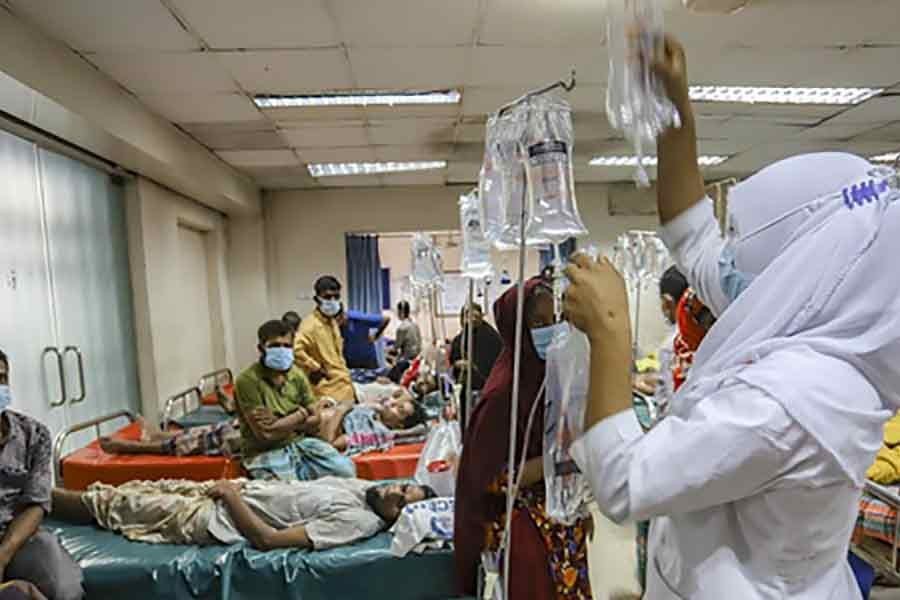A sudden outbreak of diarrhoea has swept Dhaka city and its surrounding areas for the last few weeks.
Instances of diarrhoea usually increase during summer, but this year the disease has spread a bit earlier.
“Its early occurrence this year, could be due to people drinking polluted water or eating unhygienic street food,” said Dr Pollob Kumar Chandra, a medicine practitioner at LABAID Ltd. (Diagnostic), Narayanganj.
According to the World Health Organisation, diarrhoea is a symptom of an infection in the intestine caused by a variety of bacterial, viral, and parasitic species.
Dr Chandra said, “It is a waterborne disease, and rising temperatures in the summer allow for the rapid growth of bacteria, viruses, or parasites in water and food, so its consumption induces diarrhoea.”
Diarrhoea has been diagnosed in over 450,000 people across the country in the past 3 months only.
In the past few weeks, the International Centre for Diarrhoeal Disease Research, Bangladesh (icddr,b) hospital in Dhaka has seen a dramatic increase in diarrhoea patients that has outperformed all previous records from the past 40 years.
The disease has already spread to at least ten neighbourhoods in Dhaka, Jatrabari in old Dhaka being the most impacted, followed by Dakshinkhan and Rayer Bazar.
For the past several days, the hospital associated with the icddr,b in Mohakhali has been receiving roughly 1,200 diarrhoea patients every day which is the highest daily total in the hospital’s 60-year experience.
Other hospitals such as the Dhaka Medical College Hospital (DMCH), have also seen a spike in the number of patients. Following capital, the diarrhoea outbreak has now spread to Kurigram, Rajshahi and other districts in Bangladesh.
Although it appears to be more common in children usually, approximately 70-80 per cent of patients at this time are adults.
Due to the heat and horrible traffic jams in Dhaka throughout the summer, many individuals drink juice or water from the streets to quench their thirst. Typically, unsafe water is often used to prepare the juice in a poor unhealthy environment, which ultimately spreads the infection.
Farhan Akhter, 48, of Jatrabari, was hospitalised at icddr,b hospital with diarrhoea last week.
“The day before admitting, my wife and I were stuck in traffic for two or three hours at noon, and we were so fatigued that we drank watermelon juice from a roadside stall.
“Unfortunately, both of us ended up getting diarrhoea. I drank plenty of saline water at first, but I had to go to the hospital at night because I was severely dehydrated,” he explained.
Patients normally do not require much medication, however, drinking saline is more important in this case. Nevertheless, they should seek medical advice, as antibiotics may be prescribed.
In fact, if the patient’s condition is not severe, it can be managed at home, although rehydration is critical.
“Patients should consume more saline water than excretion to avoid dehydration, but if they start excreting more water than they uptake or having tongue dryness, dizziness, or weakness, they will need IV saline,” advised Dr Chandra.
He recommended patients eat Govindavogh rice with boiled green bananas or potatoes, and green coconut water as well, and avoid fruit juice, soft drinks, grapes, vegetables, dal, fish, meat, and eggs until they recover.
Dr Chandra also strongly recommended using boiled water, not eating open or unhygienic food from the roadside stalls and washing hands with soap before and after eating.
Furthermore, fruits and vegetables must be properly washed before intake, and fish and meat must be thoroughly fried when cooked.
While diarrhoea infection can happen any season of the year, scorching hot Summer days are especially riskier. Hence, extra precautions are advisable.


